 62 citations,
October 2017 in “JAMA facial plastic surgery”
62 citations,
October 2017 in “JAMA facial plastic surgery” Condensed nanofat with fat grafts effectively improves atrophic facial scars.
 43 citations,
June 2016 in “Clinics in Plastic Surgery”
43 citations,
June 2016 in “Clinics in Plastic Surgery” The conclusion is that fat grafting is safe and effective but carries risks that need careful management.
 35 citations,
March 2014 in “British Journal of Dermatology”
35 citations,
March 2014 in “British Journal of Dermatology” Hair loss in male pattern baldness involves muscle degeneration and increased scalp fat.
 25 citations,
June 2013 in “Obesity Reviews”
25 citations,
June 2013 in “Obesity Reviews” Mesotherapy might help reduce fat in specific areas for those close to their ideal weight, but more research and care are needed to ensure safety.
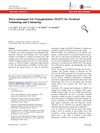 24 citations,
April 2017 in “Aesthetic plastic surgery”
24 citations,
April 2017 in “Aesthetic plastic surgery” MAFT is a reliable method for forehead contouring with high patient satisfaction and long-term results.
 22 citations,
October 2011 in “Bone”
22 citations,
October 2011 in “Bone” Androgens affect bone and fat cell development differently based on the cells' embryonic origin.
 14 citations,
September 2015 in “Ophthalmic plastic and reconstructive surgery”
14 citations,
September 2015 in “Ophthalmic plastic and reconstructive surgery” Surgical removal of abnormal fat pads fixed the woman's eyelid issue caused by likely silicone injections.
 14 citations,
August 2014 in “Applied Physiology, Nutrition, and Metabolism”
14 citations,
August 2014 in “Applied Physiology, Nutrition, and Metabolism” A low-starch/low-dairy diet may help overweight women with PCOS lose weight and improve metabolism, but more research is needed.
14 citations,
October 2010 in “Dermatologic Surgery” Fat transplantation can help regrow hair lost due to scleroderma.
 13 citations,
June 2019 in “Case reports in dermatology”
13 citations,
June 2019 in “Case reports in dermatology” Fat injections in the face can cause hair loss.
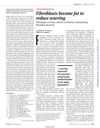 13 citations,
February 2017 in “Science”
13 citations,
February 2017 in “Science” Turning scar-forming cells into fat cells can reduce scarring.
9 citations,
June 2020 in “Cell stem cell” Skinny fat cells help wounds heal faster by releasing fatty acids.
 8 citations,
February 2020 in “Aesthetic Surgery Journal”
8 citations,
February 2020 in “Aesthetic Surgery Journal” Adding cells to fat grafts improves hair regrowth in early baldness, but effects lessen over time.
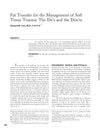 8 citations,
November 2010 in “Facial Plastic Surgery”
8 citations,
November 2010 in “Facial Plastic Surgery” Fat transfer can be effective for soft tissue trauma if the patient is chosen carefully and the procedure is done correctly.
 6 citations,
July 2018 in “JAMA facial plastic surgery”
6 citations,
July 2018 in “JAMA facial plastic surgery” Injecting minced fat into the facial artery can cause severe eye problems and death, more so than other fat types, and larger amounts increase these risks.
4 citations,
September 1977 in “Lipids” Gerbils on a fat-deficient diet had altered fatty acid levels, hair loss, reduced sperm, and lower body weight.
 3 citations,
December 2020 in “Journal of Cosmetic Dermatology”
3 citations,
December 2020 in “Journal of Cosmetic Dermatology” Fat injections can help regrow hair in stubborn hair loss cases.
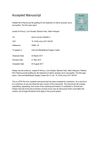 3 citations,
August 2017 in “Oral and Maxillofacial Surgery Cases”
3 citations,
August 2017 in “Oral and Maxillofacial Surgery Cases” Using platelet-rich plasma and fat grafting to treat nerve pain showed promising results with no side effects.
 2 citations,
June 2020 in “Dermatologic Surgery”
2 citations,
June 2020 in “Dermatologic Surgery” Fat grafting before hair transplant may improve hair growth in scarring alopecia.
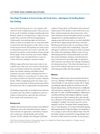 2 citations,
September 2019 in “Dermatologic Surgery”
2 citations,
September 2019 in “Dermatologic Surgery” The two-step procedure of fat grafting followed by hair grafting improves scalp and facial scar correction.
 1 citations,
March 2018 in “Hair transplant forum international”
1 citations,
March 2018 in “Hair transplant forum international” Using one's own fat may help treat hair loss.
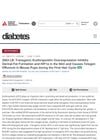
Erythropoietin overexpression disrupts hair growth and fat formation in mice.

A high fat lard diet may protect against skin fibrosis and affect hair growth.
 March 2024 in “Middle East Fertility Society Journal/Middle East Fertility Society Journal ”
March 2024 in “Middle East Fertility Society Journal/Middle East Fertility Society Journal ” PCOS patients have more central body fat, which can be effectively measured using DEXA.
 November 2023 in “Journal of cosmetic dermatology”
November 2023 in “Journal of cosmetic dermatology” Fat transplants using a patient's own fat can rejuvenate and repair tissues effectively.
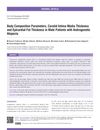 September 2023 in “Journal of the turkish academy of dermatology”
September 2023 in “Journal of the turkish academy of dermatology” Men with male pattern baldness had higher body fat and obesity-related measurements but similar heart fat and artery thickness compared to healthy men.
 August 2023 in “Stem Cell Research & Therapy”
August 2023 in “Stem Cell Research & Therapy” A substance called Cell-free fat extract can effectively treat common hair loss by increasing hair growth and density.
August 2018 in “Australasian journal of dermatology” Hyaluronic acid filler and fat grafting can cause rare skin complications.

Processed fat, SVF, and PRP are safe and effective for facial rejuvenation and hair growth.
 July 2012 in “The Journal of Urology”
July 2012 in “The Journal of Urology” Testosterone increases muscle mass regardless of DHT conversion blocking.


























